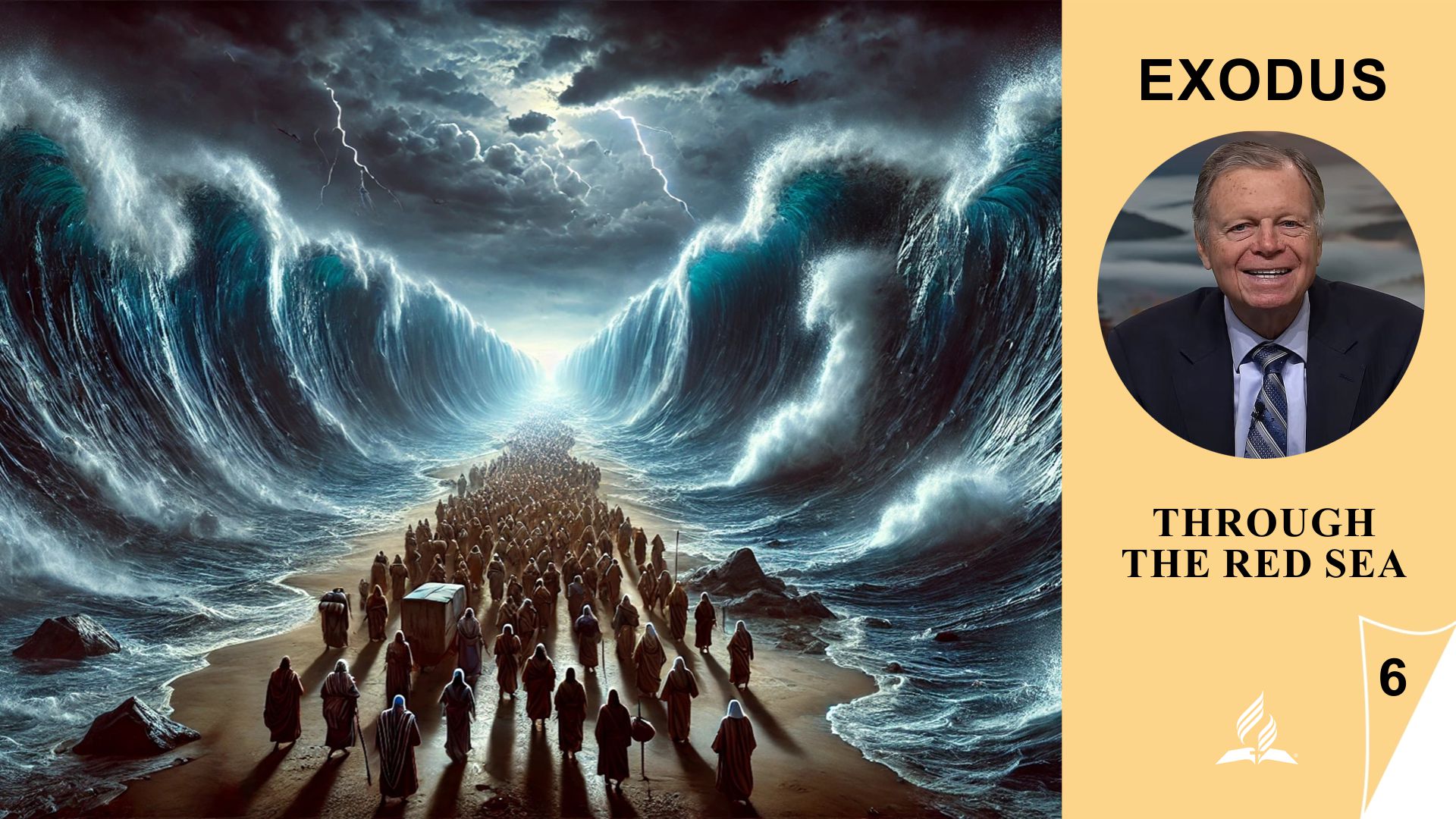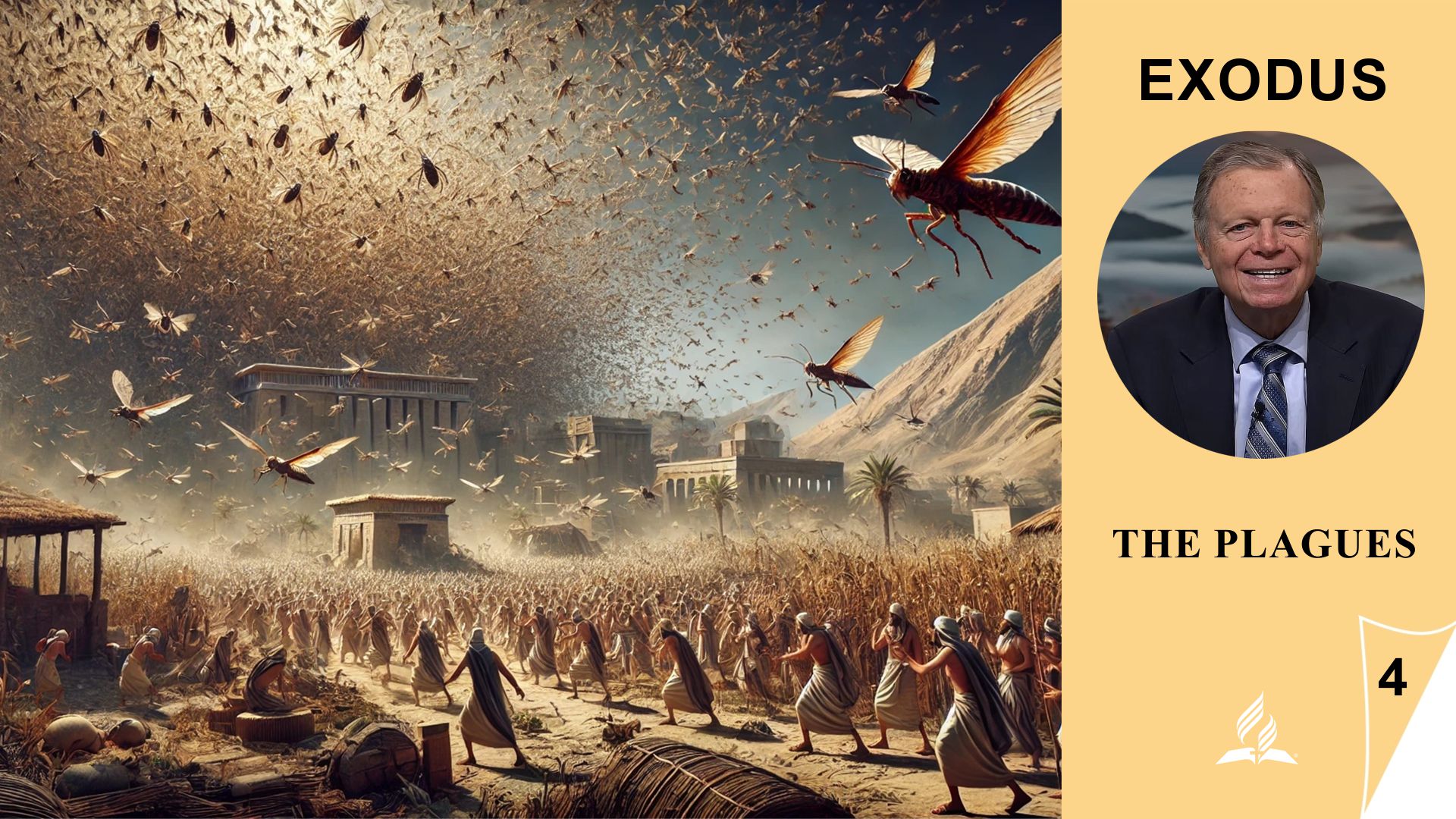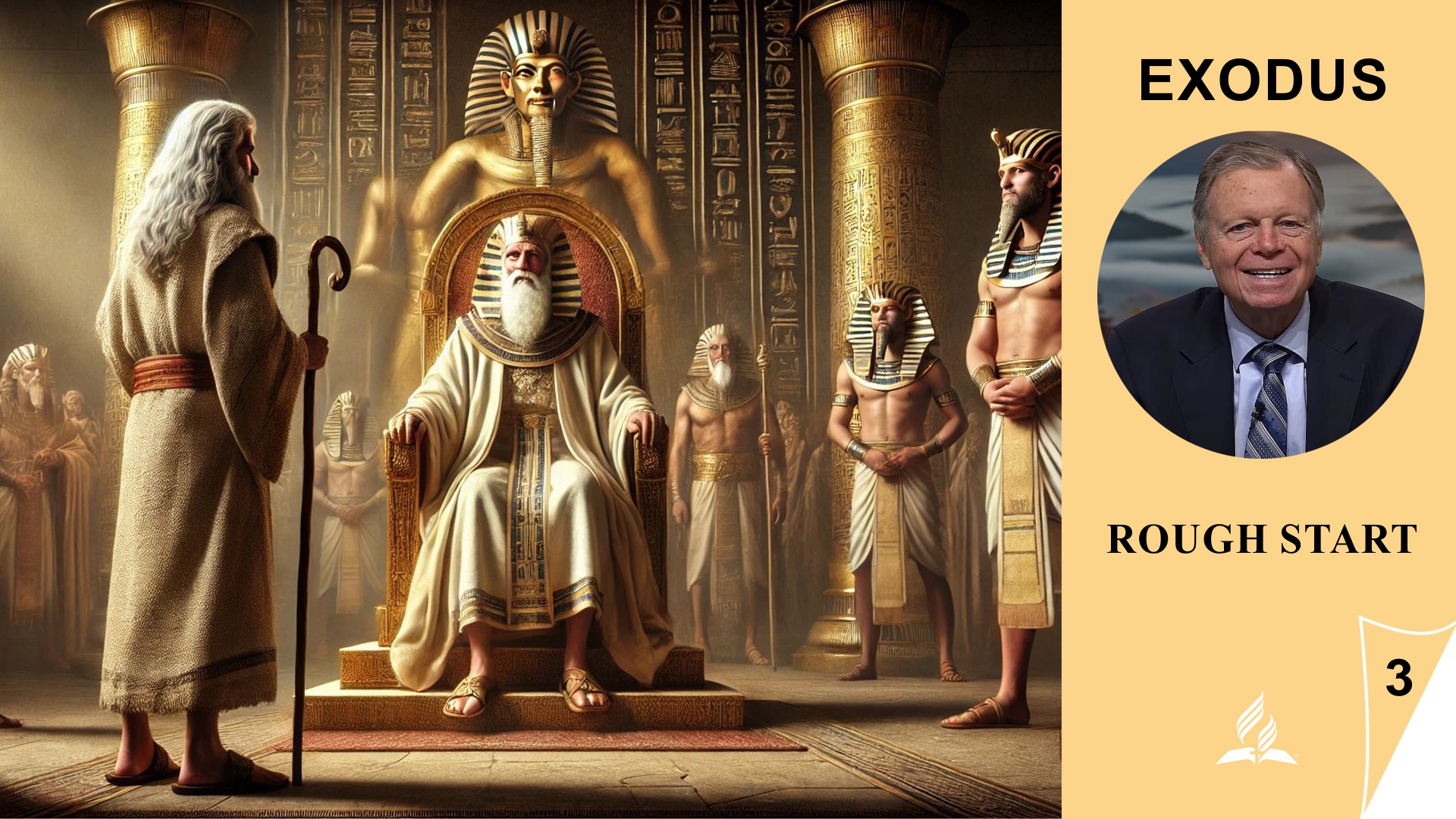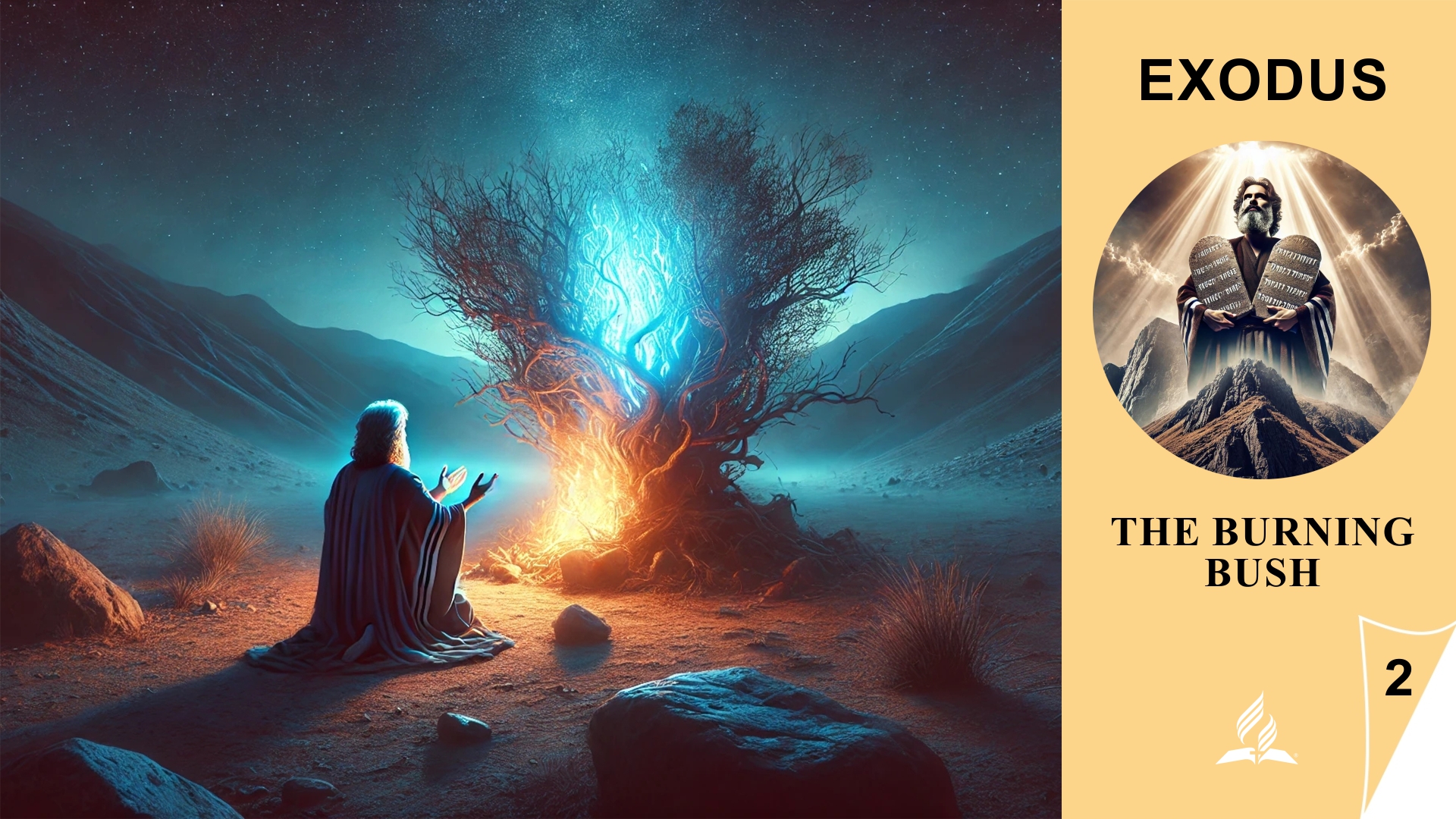
Exodus – Lesson 5.Passover | Sabbath School with Pastor Mark Finley

Series EXODUS with Pastor Mark Finley
Lesson 5.Passover
Passover: God Delivers with Grace and Judgment
Lesson 5 takes us into the dramatic climax of the ten plagues and the institution of the Passover feast. In the midst of judgment and suffering, God reveals His saving grace: a lamb is sacrificed, and its blood protects the faithful from destruction. This sign becomes a powerful symbol of redemption—then for Israel, now for us through Christ. Passover is more than a historical event; it is an invitation to remembrance, gratitude, and the transmission of faith. God acts with justice, but His ultimate goal is always salvation. This lesson invites us to trust His leading and place our lives under the sign of His blood.
Content:
5.1 One More Plague
The Final Warning – God’s Patience Before Judgment
Before God brought the most severe judgment upon Egypt, He once again issued a clear and serious warning. The three days of darkness were not only a sign but also an invitation to repentance. But Pharaoh’s hardened heart drove Moses to righteous anger—not out of personal rage, but sorrow over the coming suffering. The tenth plague revealed the fullness of divine justice: complete, deliberate, and long restrained. God does not judge randomly, but always with patience, clarity, and grace. We too are called to unite justice with mercy—not judging harshly, but acting with compassion.
5.2 Healing the Body
The Meal of Remembrance and Hope
Instead of issuing escape instructions, God places the Passover at the center—a feast of faith before the actual deliverance. This shows that worship and trust in God’s action precede rescue. The blood on the doorposts became a sign of exemption—a powerful symbol of God’s protection and grace. Passover thus became not only a memorial but a reaffirmation: God is faithful—then, now, and in the future. For each generation of Israel, the feast was a personal declaration of faith in the living God. Likewise, we are strengthened in trust when we remember God’s guidance in our lives.
5.3 Pesach
Sign of the Blood, Sign of Redemption
At the Pesach feast, the blood of the lamb played a central role—it was the visible sign of trust in God’s protection. The blood on the doorposts set the faithful apart from those who rejected God’s warning. This blood pointed prophetically to Jesus Christ, the true Lamb of God sacrificed for the sins of the world. Unleavened bread and bitter herbs deepened the meaning: purity, suffering, and God’s grace are at the heart of salvation. Pesach connected past and future—the liberation of Israel with the redemption through Christ. It reminds us that salvation came at a price: the precious blood of God’s Son.
5.4 Passing the Torch
The Torch of Faith – Passing On What God Has Done
God commissioned parents not just to tell stories but to help their children experience the reality of deliverance. The memory of the exodus was to remain alive—not as distant history but as a personal journey. Faith was passed on through celebration, storytelling, and internalization. Children were to know: “I too have been delivered.” The retelling strengthened both the hearers and the tellers in faith. Today, we are invited to carry on this spiritual tradition and testify to what God has done in our lives.
5.5 The Divine Judgment
Divine Judgment – When Justice Is Revealed
The tenth plague struck the heart of Egyptian society—the firstborn—and revealed the powerlessness of their gods. God’s judgment was not random, but a just response to years of oppression and the murder of Israel’s sons. This judgment targeted Egypt’s idol-based power and proved that no other “god” can save. The tragedy affected many, even the innocent—a vivid picture of sin’s far-reaching consequences. What people sow, they will reap (Gal. 6:7). Our only hope remains in the blood of the true Firstborn—Jesus Christ, who died for the sin of the world.
5.6 Summary
Passover: Remembrance of Redemption and Judgment
Lesson 5 highlights the Passover as a central event in Israel’s deliverance from Egypt. Through Moses, God announced the final plague—the death of the firstborn—but also gave clear instructions for salvation through the lamb’s blood. Passover was instituted as a remembrance of God’s grace and judgment, meant to unite generations. It was an act of faith and a symbol of ultimate redemption through Christ, the true Passover Lamb. Parents were to pass the story on to strengthen faith and identity. Passover reveals God’s holiness, justice, and saving love for all who trust in Him.
Source: https://fulfilleddesire.net/exodus-lesson-5-passover-sabbath-school-with-pastor-mark-finley/
Exodus – Lesson 4.The Plagues | Sabbath School with Pastor Mark Finley

Series EXODUS with Pastor Mark Finley
Lesson 4.The Plagues
God’s Power in the Battle Against False Gods
Lesson 4 takes us deep into the dramatic conflict between the living God and the gods of Egypt. The ten plagues were not mere natural disasters, but targeted revelations of divine power over human arrogance and religious deception. Each plague struck the Egyptians where they felt most secure—in their gods, their king, and their economy. God demonstrated that He alone is Lord over life, nature, and history. It wasn’t only about punishment—it was also about revelation and the opportunity for repentance. This lesson challenges us to identify the “gods” in our own lives and to worship God as the one true Lord.
Content:
4.1 God vs. gods
The True King – God’s Power Over All False Gods
The first confrontation between the God of Israel and the gods of Egypt was not just a power struggle, but a divine judgment on religious deception. When Aaron’s staff turned into a serpent and devoured the serpents of the Egyptian magicians, the superiority of the living God was made evident. God publicly challenged Pharaoh’s authority and Egypt’s entire religious system. Aaron’s staff symbolized that it is not Pharaoh who rules, but the LORD. This first display of power directly attacked belief in magic and idolatry. Today, God still calls us to place all our modern “gods”—such as power, wealth, and fear—under His authority.
4.2 Who Hardened Pharaoh’s Heart?
A Hardened Heart – Choosing Against God’s Grace
The Bible clearly shows that Pharaoh initially hardened his own heart before God confirmed and strengthened that choice. God’s actions were not arbitrary; they were a response to Pharaoh’s persistent resistance. The plagues were opportunities for repentance—but Pharaoh consciously chose to reject the truth. God’s judgment often means letting people follow their own path without His restraining grace. This reveals both the power of divine grace and the serious weight of human responsibility. Like Pharaoh, we also face daily choices that either soften our hearts to God’s voice or harden them through pride.
4.3 The First Three Plagues
God Exposes the Gods of Egypt – Three Plagues, Three Revelations
The first three plagues revealed the powerlessness of Egypt’s gods—Hapi, Heket, and Geb—over water, fertility, and the earth. None could give life or stop the disasters. Through these plagues, God revealed Himself not only to Pharaoh but also to His own people. They were not just acts of judgment, but signs pointing to divine truth and an invitation to know God. Even the magicians acknowledged God’s power, but Pharaoh remained stubborn. This shows the danger of repeatedly ignoring God’s voice—every refusal makes the heart harder.
4.4 Flies, Livestock, and Boils
Gods Fall – God Remains
With the plagues of gnats, livestock disease, and boils, God again exposed the helplessness of Egypt’s deities. Goddesses like Uatchit, Hathor, and Isis failed to protect their followers. In contrast, the Israelites were spared—clearly showing God’s presence and care. Despite mounting pressure and overwhelming evidence, Pharaoh’s heart remained hard. The issue wasn’t lack of evidence—it was a refusal to humble himself. This episode warns us: a stubborn heart can reject even the clearest truth. That’s why we must keep our hearts open to God’s voice.
4.5 Hail, Locusts, and Darkness
God’s Power Breaks Through All Darkness
The final three plagues struck at the core of Egypt’s religion and pride. Gods like Nut, Osiris, Seth, and Ra could neither protect nor provide light. Though Pharaoh wavered, pride overcame reason. God made it clear that He alone controls the elements, light, and life. The separation between Israel’s light and Egypt’s darkness was a visible sign of God’s justice and mercy. Despite the suffering, Pharaoh refused to submit to God’s will—possibly out of sheer pride. The story powerfully illustrates the truth: “Pride goes before destruction” (Proverbs 16:18).
4.6 Summary
God Reveals Himself as Lord Over All Gods
In Lesson 4, the ten plagues reveal God’s judgment not only over Egypt but especially over its false gods. Each plague exposed the inability of Egypt’s deities and highlighted God’s sovereignty. Repeatedly, God revealed Himself to invite repentance—from Pharaoh and from His people. But Pharaoh’s pride continued to harden his heart until he fully resisted God’s will. The lesson shows us: God’s patience is great, but not limitless. Those who persistently reject His call ultimately choose judgment over grace.
Source: https://fulfilleddesire.net/exodus-lesson-4-the-plagues-sabbath-school-with-pastor-mark-finley/
Exodus – Lesson 3.Rough Start | Sabbath School with Pastor Mark Finley

Series EXODUS with Pastor Mark Finley
Lesson 3.Rough Start
Calling Amid Resistance – God’s ways are not always easy, but they are certain
Lesson three explores the difficult beginning of Moses’ mission to free Israel from slavery. Despite clear instructions from God, Moses is immediately met with rejection—by Pharaoh and even his own people. What began with hope quickly turns into frustration. Moses doubts, complains to God, and feels overwhelmed. But it is precisely in this tension that God begins to reveal His power and faithfulness. The lesson reminds us: even when walking with God is challenging, we can trust that He will lead us to a good end.
Content:
3.1 Who Is the LORD?
When human pride challenges divine authority
Pharaoh’s reaction reveals a deep spirit of resistance against God—not out of ignorance but conscious defiance. By asking, “Who is the LORD?”, he places himself above divine authority and exposes the core of human rebellion. This attitude is not limited to ancient Egypt; it persists today in systems and hearts that ignore or fight against God. Yet God’s response to rejection is not revenge, but revelation: He reveals Himself through patience, grace, and power. To know the LORD is to know that He is holy, faithful, gracious, and just—a God who saves and liberates. Knowing Him changes everything—it turns slaves into free people.
3.2 A Rough Start
When deliverance starts with setbacks
Moses and Aaron obeyed God’s command, but instead of freedom, more suffering followed. The Israelites were disappointed, their hopes were crushed, and they blamed Moses and Aaron. These setbacks show that God’s ways are often not linear—even faith has its crises. For Moses, this was an early taste of the challenges of spiritual leadership. But in these moments, leaders learn to develop patience, humility, and trust in God. We, too, should be gracious with our leaders—especially when the way is hard and progress is invisible.
3.3 The Divine “I”
Despair meets promise – when God answers our complaint
Moses is deeply discouraged—rejection and increased suffering have replaced hope. His honest complaint to God shows that even great men of faith wrestle with God’s ways. But God doesn’t rebuke him. Instead, He reminds Moses of His promises and faithfulness with powerful “I will” statements. These assurances show that lament is acceptable when it comes from trust and hope. God does not ignore our pain—He hears, acts, and leads us to His goal.
3.4 Uncircumcised Lips
When discouragement closes ears – God’s promise still stands
Despite God’s powerful promises, Moses couldn’t reach the people—their discouragement was too deep. Pain, frustration, and unmet expectations had hardened their hearts. Moses once again felt unfit, a “man of uncircumcised lips.” But God’s plan did not depend on the people’s mood or Moses’ ability—it rested on God’s faithfulness. In times of weakness and doubt, it’s crucial to hold on to God’s promises—even when they’re not yet visible. The covenant formula “I will be your God” reminds us: our relationship with Him carries us, even when our strength fails.
3.5 Like God to Pharaoh
God equips those He calls – even in spite of excuses
Moses still felt unfit and again voiced his doubts. But God’s patience is great: He takes Moses’ objections seriously, gives him Aaron as a helper, and explains his role—as God’s mouthpiece. Thus, God gives Moses dignity and authority, despite his weakness. At the same time, God warns of Pharaoh’s hard heart but makes it clear that His power will be revealed in the end. This passage shows: God doesn’t expect perfection, but trust. Our excuses may be understandable—but God calls us anyway and equips us to fulfill His will.
3.6 Summary
When the beginning is difficult – God’s plan endures
In lesson 3, we see a discouraged Moses, a defiant Pharaoh, and a disappointed people. God’s command was clear, but the path began with difficulty: Pharaoh rejected God’s authority, and the people responded with frustration rather than faith. Moses himself doubted his calling and poured out his grief to God. But God responded with powerful promises and renewed affirmation of His faithfulness. This lesson shows: even when the beginning is full of setbacks, God continues His work—patiently, resolutely, and faithfully.
Source: https://fulfilleddesire.net/exodus-lesson-3-rough-start-sabbath-school-with-pastor-mark-finley/
Exodus – Lesson 2.The Burning Bush | Sabbath School with Pastor Mark Finley

Series EXODUS with Pastor Mark Finley
Lesson 2.The Burning Bush
God Encounters – Moses at the Burning Bush
Lesson 2 brings us to a crucial turning point in Moses’ life. In the solitude of the wilderness, he encounters God in an unexpected way – in a burning bush that is not consumed. This holy appearance is more than a miracle: it is the beginning of God’s active intervention to deliver Israel. Moses is called to stand before Pharaoh with divine authority, even though he feels weak and unqualified. But God reveals His name, His nearness, and His plan. The lesson shows us how God calls ordinary people in their weakness – and equips and sends them with His Spirit.
Content:
2.1 The Burning Bush
God Meets Moses: The Burning Bush as a Turning Point of Calling
The burning bush marks a sacred turning point in Moses’ life. After 40 years in the solitude of Midian, he encounters God in a supernatural way – not with power, but in a humble thorn bush that is not consumed. This appearance shows that God works through weakness and simplicity, yet with holy authority. As Moses removes his sandals, his journey from shepherd to Israel’s deliverer begins. God’s self-introduction as “the God of Abraham, Isaac, and Jacob” reminds Moses of the enduring validity of the promises. This scene teaches us: calling takes time – and God often forms His instruments in secret before using them publicly.
2.2 The Angel of the Lord
The Angel of the Lord – Jesus as the Divine Messenger of Deliverance
In the appearance of “the Angel of the Lord,” no one less than Christ Himself is revealed – speaking to Moses from the burning bush. The term “angel” here does not refer to a created being, but to the divine Messenger who is God Himself. This encounter reveals not only God’s presence but also His compassion: He sees His people’s suffering and intervenes personally. Moses is entrusted with an overwhelming task – the deliverance of Israel. His reaction, “Who am I?” shows deep humility and self-doubt, but also reverence for the divine call. God uses precisely such humble hearts because they rely not on themselves but on His power.
2.3 The Name of the Lord
“I Am Who I Am” – God’s Name as a Revelation of His Presence
Moses asks for God’s name because he wants to know who is sending him – and what he should say to the people. God’s answer “I Am Who I Am” reveals more than a name: it shows God’s eternal presence, reliability, and closeness. “Yahweh” not only means that God exists, but that He is personally involved in the lives of His people. This name stands for God’s faithfulness in the covenant and His care for the suffering. It becomes clear to Moses: the God of the patriarchs is still the same – alive and active today. To call upon the name of the Lord means trusting not a distant deity, but a God who lives among His people.
2.4 Four Excuses
Four Excuses – and God’s Patient Calling
Despite God’s direct call, Moses tried to avoid his responsibility with four excuses. He felt unworthy, feared rejection, doubted his impact, and saw himself as a poor speaker. But God did not respond with anger – instead, He gave reassurance, signs, and support, revealing His patience and care. God’s calling is not directed at the most capable, but at those willing to be equipped by Him. Aaron was given as a concrete helper, but the mission remained Moses’. We, too, may bring our weaknesses honestly before God – and experience how He reveals His strength right there.
2.5 The Circumcision
Obedience Under the Covenant – The Serious Lesson of Circumcision
The incident with the neglected circumcision shows how seriously God takes obedience and covenant faithfulness – especially for someone like Moses, called to lead. Although Moses obeyed the divine call, he had neglected a known duty, which made him vulnerable. God could not use him as Israel’s spiritual leader while he was inconsistent himself. Zipporah’s decisive intervention saved Moses’ life, but it also revealed the urgency of not delaying God’s clear commands. This dramatic scene shows: God is merciful, but also holy – and negligence can be dangerous. If we know what is right but hesitate to do it, God lovingly yet firmly calls us to turn and act.
2.6 Summary
God’s Call from the Fire – Calling, Name, and Mission
In Lesson 2, we meet Moses at the burning bush – a sacred moment when God personally calls him. After 40 years in the wilderness, God reveals Himself as the “I Am” – eternal, faithful, and present. He commissions Moses to lead Israel out of Egypt, despite Moses’ doubts and excuses. God responds to his objections with patience, power, and promises – and even sends Aaron as help. God’s name “Yahweh” shows that He is a covenant God who acts in love. The lesson reminds us: God calls ordinary people with humble hearts to extraordinary tasks – and equips them fully.
Source: https://fulfilleddesire.net/exodus-lesson-2-the-burning-bush-sabbath-school-with-pastor-mark-finley/
- « Previous Page
- 1
- 2
- 3
- 4
- 5
- 6
- …
- 385
- Next Page »
